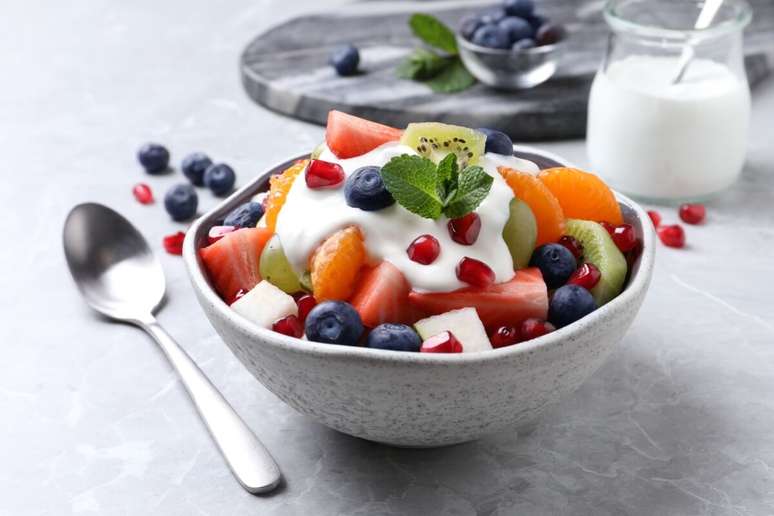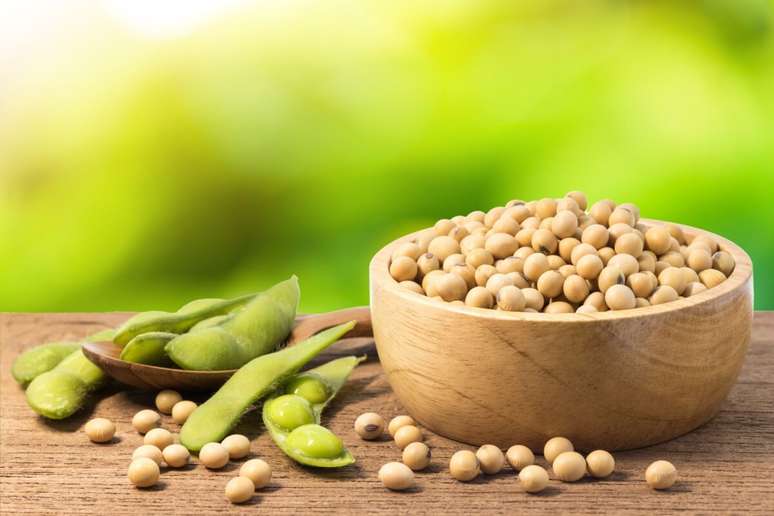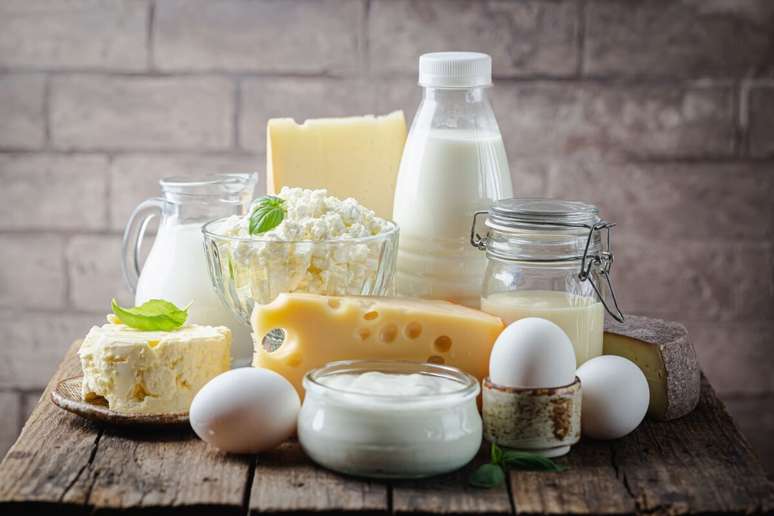Discover how important a varied diet is to help prevent disease and improve the functioning of the body
Pregnancy, menopause and the menstrual cycle are some of the phases that mark a woman’s life. To face them with health and well-being it is necessary to maintain a balanced and varied diet. Although each person and each phase of life has specific needs, some foods provide nutrients that, in general, benefit female health and offer numerous advantages to the body.
To dive deeper into this topic, some experts highlight the most important foods for women’s health. Check them out below!
1. Milk and dairy products
Milk and dairy products, as well as other sources of calcium, are essential for strengthening women’s bones and preventing the risk of osteoporosis. “The risk of osteoporosis is higher in women, because estrogen is a hormone that has the ability to protect bones. However, during menopause, there is a drop in estrogen levels in the body, which causes the loss of this protective factor, favoring osteoporosis and, consequently, fractures,” says Dr. Deborah Beranger, endocrinologist with a specialization in Endocrinology and Metabology at the Santa Casa de Misericórdia do Rio de Janeiro (SCMRJ).
One option for adding more flavor to fruit is Greek yogurt. “This food is an excellent source of calcium, essential for healthy bones and teeth in women. In addition, Greek yogurt is a source of high-quality protein, important for building and repairing muscle tissue. The best choices are the unsweetened versions,” explains nutritionist Dr. Marcella Garcez, director and professor of the Brazilian Association of Nutrology (ABRAN).
2. Dark green leaves
In addition to being a great source of calcium, dark green leaves, such as spinach and kale, provide a host of other benefits to a woman’s body, according to Dr. Deborah Beranger. “Dark green leaves are rich in iron and vitamins. Therefore, they help prevent anemia, especially in women who have increased menstrual bleeding, and can help reduce swelling in the premenstrual period,” says Dr. Andrea Neves Soares, a gynecologist at Clínica Allena.
Dr. Deborah Beranger explains that because of the blood loss during menstruation, there is also a loss of iron, which needs to be replenished. “And dark green leaves are a great way to replenish iron, as they are also high in vitamin C, which helps increase the absorption of this nutrient,” she adds.
3. Black beans
According to nutritionist Dr. Marcella Garcez, the black beans It is another excellent source of iron, as well as folic acid, which is essential for female reproductive health. “Black beans are also an important source of amino acids and fiber. Therefore, their consumption can help maintain digestive health and regulate blood sugar levels, preventing type 2 diabetes,” explains the expert.

4. Antioxidant fruits
According to Dr. Andrea Neves Soares, a gynecologist, antioxidant fruits are important for women’s overall health. “Grapes are rich in resveratrol, an antioxidant that has anti-inflammatory properties and helps prevent breast cancer. And oranges are rich in vitamin C, which helps with immunity and collagen production,” she says.
5. Flax seeds
Flaxseeds are a great source of lignans, which help regulate hormone levels and breast health; omega-3 fatty acids, which are known to reduce LDL cholesterol and inflammation in the body; and, most importantly, soluble fiber, according to registered dietitian Dr. Marcella Garcez.
And high-fiber foods are essential for women because they are more prone to constipation. “High progesterone during pregnancy and in certain phases of the hormonal cycle promotes constipation. There is also a social issue: women are more shy about going to the bathroom outside the home. But it is more of a hormonal issue,” she says.
It is therefore worth investing in other foods such as oats, chia and quinoa. “Quinoa is rich in fibre and complex carbohydrates, provides sustained energy and helps regulate blood sugar levels, as well as being an excellent source of complete plant-based protein, containing all the essential amino acids needed for muscle health and cellular function,” adds Dr. Marcella Garcez.
6. Oilseeds
Almond, hazelnut, chestnut, macadamia, walnuts and other oilseeds also provide numerous benefits to women’s health. “Rich in selenium, zinc, magnesium and calcium, oilseeds fight inflammation in the body, improve immunity and help reduce cholesterol, in addition to having a powerful antioxidant capacity,” says Dr. Andrea Neves Soares.

7. Soy
Soy and soy products, such as tofu and edamame, are great for easing menopause symptoms, such as hot flashes, as well as providing benefits for bone and cardiovascular health. This is because soy is rich in isoflavones, a type of phytoestrogen.
“Phytoestrogens are plant compounds that have a similar chemical structure to the estrogen hormones found in the human body. Therefore, they are able to bind to estrogen receptors and act as modulators of hormone levels. During menopause and the menopause transition, when estrogen in the body decreases, foods rich in phytoestrogens can help relieve symptoms and provide health benefits, but it is worth remembering that they are not a hormone replacement therapy,” emphasizes Dr. Marcella Garcez.
8. Salmon
A source of high biological value protein, salmon is rich in omega-3 fatty acids. “Salmon is beneficial for cardiovascular health in women, helping to reduce the risk of heart disease. In addition, omega-3 fatty acids can contribute to mental health, helping to reduce depression and anxiety,” says Dr. Marcela Garcez.
In addition, fatty acids, such as omega-3s, also form hormones themselves. “They therefore help alleviate hormone deficiency, thus helping to reduce hot flashes,” says Dr. Deborah Beranger, who points to brown rice, oats, broccoli, flaxseeds, sunflower seeds, and kale as other sources of this acid.
9. Blueberry
Well known in juice form, blueberry is a reddish fruit rich in flavonoids. “In this way, the blueberry It helps to delay aging and also fight stress in the body, as well as being an important prevention tool urinary infection for women who suffer from this problem”, underlines Dr. Andrea Neves Soares, gynecologist.
10. Egg
According to Dr. Marcella Garcez, eggs are a great source of high-quality protein, as they contain all the essential amino acids needed for muscle health and cell repair. “Plus, eggs are high in choline, which is important for brain health and preventing birth defects during pregnancy,” she adds.
Finally, it is important to emphasize that, although some nutrients are more important depending on the stage of a woman’s life, there is no superfood that can solve all problems and nutritional deficiencies. “The most important thing is to maintain a balanced and varied diet to meet all the needs of the body,” says Dr. Marcella Garcez.
By Pedro del Claro
Source: Terra
Ben Stock is a lifestyle journalist and author at Gossipify. He writes about topics such as health, wellness, travel, food and home decor. He provides practical advice and inspiration to improve well-being, keeps readers up to date with latest lifestyle news and trends, known for his engaging writing style, in-depth analysis and unique perspectives.





![Everything starts here in advance: the origin of hell begins for Carla … something that awaits you from 13 to October 17, 2025 [SPOILERS] Everything starts here in advance: the origin of hell begins for Carla … something that awaits you from 13 to October 17, 2025 [SPOILERS]](https://fr.web.img4.acsta.net/img/ab/b5/abb5eba4e093674a788d44f3c2c407ab.jpg)

